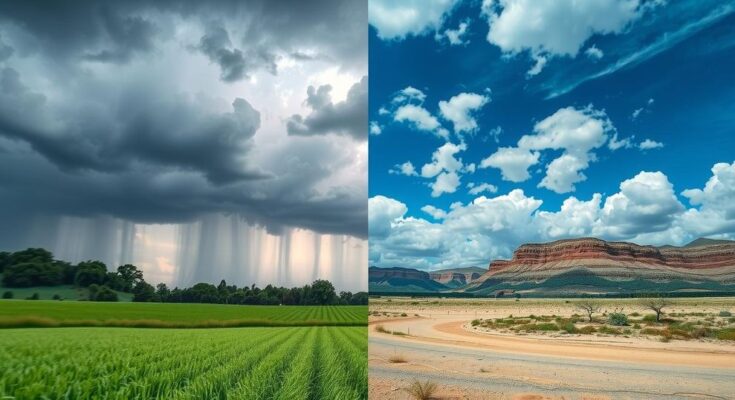The year 2025 began with extreme weather in Southern California and record temperatures globally, attributed to climate change. Scientific advancements now link specific weather events to climate change, revealing clear impacts, particularly with rising global temperatures. Not all weather variations are linked, but discrete extreme patterns reflect the ongoing influence of climate change on the climate system.
The year 2025 began with severe weather events, including 100-mph winds and significant wildfires in Southern California, as well as harsh winter storms affecting the Mid-Atlantic and Southern regions. Concurrently, scientists reported that 2024 was recorded as the hottest year in human history, attributing the extremes partially to human-induced climate change, which has increased global temperatures significantly in recent decades.
Traditionally, climate scientists have hesitated to directly connect individual weather events to climate change. However, advancements in research over the past decade have allowed for the identification of the influence of climate change on various weather-related disasters, such as heat waves, hurricanes, and wildfires. Not every unusual weather occurrence can be linked to climate change, yet the growing global temperatures have made it evident in numerous extreme weather instances.
Climate, defined as the long-term average of weather over about 30 years, serves as a baseline against which weather variations are measured. Deepti Singh explains that while odd weather patterns may occur, they do not largely alter the long-term climate average. Despite this, scientists affirm that day-to-day weather variations will continue even amid ongoing climate changes.
Since the mid-1800s, global temperatures have risen by approximately 1.3 degrees Celsius due to human activities, primarily fossil fuel combustion. This increase in temperature contributes to subtle yet discernible impacts on daily weather. Singh states that growing temperatures are influencing the current environmental conditions, leading to less freezing days and more frequent heat waves across various regions in the United States.
Human-induced climate change also disrupts complex atmospheric and oceanic patterns, sometimes resulting in unprecedented weather phenomena. For example, the intense heat wave experienced in the Pacific Northwest in 2021 can directly be attributed to climate change and the unusual atmospheric conditions that allowed such an event to occur. Alex Hall notes that the climate has been significantly altered, leading to extraordinary weather extremes.
In recent years, scientists developed methodologies known as “detection” and “attribution” to assess the impact of climate change on weather events. These methods involve simulating climate conditions without human interference and comparing results to actual scenarios to determine the extent of human influence. For instance, research indicated that Hurricane Helene’s rainfall was significantly intensified due to climate change, illustrating its role in escalating weather event severity.
Mankin likens this analytical approach to clinical trials in medicine, emphasizing the need for comparison between affected and unaffected scenarios. The critical research highlights the pervasive influence of climate change on everyday weather conditions and significant weather extremes that the world now faces.
The article discusses the relationship between extreme weather events and climate change, emphasizing recent weather patterns in 2025 and the record-setting temperatures of 2024. It elaborates on advancements made in climate science, allowing researchers to analyze how climate change influences specific weather occurrences. Through various scientific methodologies, the article provides insight into the complexity of climate vs. weather while acknowledging the challenging task of establishing direct links between individual weather events and broader climatic changes. The context is set against a backdrop of increasing global temperatures due to fossil fuel use since the 1800s, underscoring the significant effects of human activities on the planet’s atmosphere and the resultant weather phenomena that have emerged.
In summary, the growing body of evidence supports the assertion that human-induced climate change has a considerable impact on weather patterns and events. Advances in scientific methodologies have facilitated an understanding of these connections, revealing a trend of increased extreme weather occurrences worldwide. With climate conditions continuing to evolve, the relationship between climate change and daily weather will likely remain a crucial area of research and public concern.
Original Source: www.kbia.org




